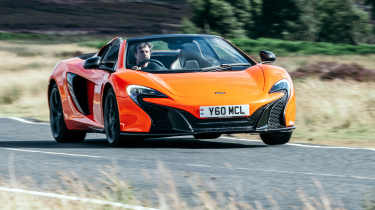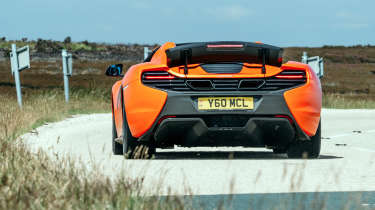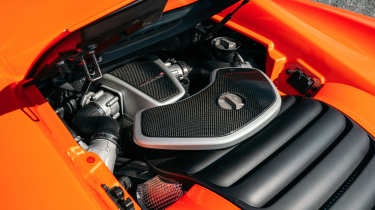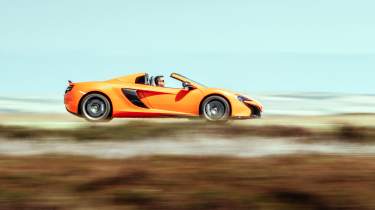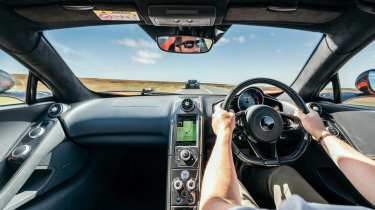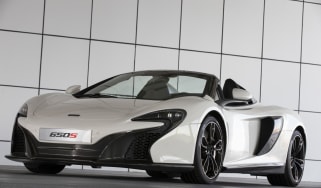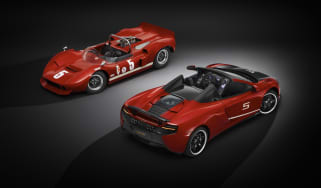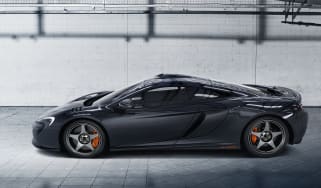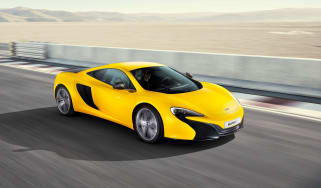Used McLaren 650S (2014 - 2017) review – a 207mph supercar for Audi RS3 money
Stunning composure, character and pace make the McLaren 650S an outstanding supercar offering. Here's how to buy one today
The mid-2010s were the era of the Holy Trinity – firstly the hybrid hypercar trio of LaFerrari, Porsche 918 Spyder and McLaren P1, then, slightly lower down the food chain, came the super-sports car trinity of 458 Speciale, 911 GT3 and the McLaren 650S. With more style and even more performance than the blistering MP4-12C that came before it, Woking's offering was a promising new entry to the supercar segment.
The 12C had promised to detonate an atom bomb on the supercar establishment when it was launched in 2011: faster, cleverer, all-carbonfibre, a McLaren to evoke the intensity of the 1990s F1 for a new age. Unfortunately for McLaren, the rival 458 Italia offered not only the allure of a Ferrari but better throttle response, more consistent brake feel, more intuitive body control and finer balance. The sensational P1 proved beyond doubt that McLaren could build a car to blow minds and pull at heart-strings; next it turned its attention to refining the 12C. The result was the 650S, a facelift and name-change in one.
> McLaren MP4-12C (2011 - 2014) – Ferrari 458 performance for used Porsche 911 money
We got our first glimpse of it in issue 194 (April 2014), where we introduced it as ‘Son of P1’. It took its swoopy, swooshy front-end design cues from the hypercar, uprated the now-familiar M838T 3.8-litre twin-turbo V8 and extensively reworked the suspension, stability control and transmission. In many ways, it was the car the 12C wanted to be from the start, with more development time and the influence of external feedback.
Engine, gearbox and technical highlights
Power was up from 616bhp to 641bhp at 7250rpm, torque up 58lb ft to 500lb ft at 6000rpm, with 95 per cent of that available between 3000 and 7000rpm. The most impressive stat was 0-100mph in 5.7sec, 0.6sec faster than an F1. This was truly the decade when baby supercars grew up.
More reviews
Just how different did it feel to the 12C? ‘Many of the sensations remain the same but there’s definitely a new edge,’ we wrote. ‘The ride is still very good indeed, but with spring rates up 22 per cent at the front and 37 per cent at the rear there’s certainly a greater connection with what’s going on down at surface level.
‘One thing never lacking in the 12C was pure speed, either of the straight-line variety or in terms of covering ground. Incredibly, the 650S elevates both to the next level. From about 3500rpm – when the 3.8-litre engine’s twin turbos really start to work – to 8500rpm it is obscenely, eye-wideningly, face-deformingly rapid.’
That hasn’t changed. Here and now, on deserted moorland, all of the above holds true. Give the 650S its head and it is savagely fast. This car is the convertible Spider version. Were it not for the extra shutlines in the roofline, it could be mistaken for the coupe – and likewise to drive, given that its stiffness resides in its carbon MonoCell chassis rather than the body, something of a McLaren USP. With the exception of Alfa Romeo’s disappointing 4C, it wasn’t until the 2020s that carbon-tubbed supercars would become more prevalent.
When we drove the 12C once more for an Icon story in issue 333 it was deeply impressive but its clever interconnected hydraulic suspension could make it feel slightly remote towards the limit. It took me a while to feel exactly what was going on – which perhaps is where some of that reputation for aloofness Yousuf mentioned comes from. That’s not the case in the recalibrated 650S. It’s far more communicative. Its suspension glides over bumps, yet still it puts you absolutely in touch with the road’s surface. Beautifully communicative steering helps here too. It’s a little busy at times, pulling and tugging over bumps and cambers, and less clean and accurate than the evolved set-up in the latest Artura, but it’s still benchmark-brilliant.
Performance, ride and handling
The handling balance is, sensibly, toward safe understeer, but that’s not to say that the 650S doesn’t have a wild side. It sounds more expressive than the 12C too; everyone who drives the 650S comments on how fierce it sounds, a sensation enhanced by being able to drop the rear screen in the Spider and let more of the V8’s sound into the cabin.
Dipping into its seemingly bottomless power and torque reserves, you’re aware that you’re at the very tip of a huge iceberg of performance. You don’t need any more power than this. There’s an argument this was the decade when cars began to become too fast for the road, and perhaps that’s true. But – like all of the cars here – the 650S has such a sense of precision and involvement that you can enjoy it at any speed.
The 650S kicked off McLaren’s rapid rotation of evolved and upgraded models, which arguably sowed the seeds for the financial difficulties the company has endured since. Residuals have suffered compared with Ferrari and Porsche, for example. (Typical used values for a 650S are around £80k-100k compared with £130-160k for a Ferrari 488.) But it also emphasises McLaren’s inherent perfectionism, which pushed others to greater heights, not least Ferrari. The 650S lost to the 458 Speciale in evo 198 but there was no shame in that. The Speciale would go on to be the first unanimously voted evo Car of the Year and one of the all-time greats. It was a special decade indeed for supercars. – James Taylor, evo issue 337
What to pay
In today's hybrid-assisted, forced-induction era the 650S slots in very nicely, especially when you consider how much they now cost. Though it came at a £20,000 premium over the 12C at just shy of £200,000 before options, McLaren depreciation worked its magic, bringing earlier, higher-mile examples down to just £75,000 – to put that into perspective, a new Audi RS3 can be optioned to just shy of £80,000 should you tick enough boxes. The cheapest 12Cs at the time of writing (October 2025) are on the market for just shy of £60,000, rising towards £100,000 for the very best examples.
Spend £15-20k more and you’ll have yourself a high-spec example with sub-20,000 miles, with the very best MSO-optioned cars costing in the region of £100,000. Increase the budget further and you can have yourself MSO's exclusive Long Tail take on the 650S, the 675LT, for under £200,000 – the most desirable cars will cost you around the £210,000 mark, but nevertheless, that's still an awful lot of car for the money.
What to look out for
Of course, there are reasons for depreciation. An oversupply of new cars is one possible explanation, but poor overall reliability is the primarily culprit. While there’s not a single point of failure on the 650S, numerous issues relating to poor quality control have been known to surface over the years, ranging from poor panel alignment to spontaneously shattering glass. One plus is that the M838T engine saw use in everything from the 12C to the P1 GTR, and so – while pricey – spare parts (and even engines) aren’t quite as ruinous as something more bespoke.
For a full rundown on precisely what to look out for when buying a used McLaren of any kind, read our guide in which we dive deep into the topic with McLaren specialist Thorney Motorsport.
McLaren 650S specs
| Engine | 3.8-litre twin-turbocharged V8 |
| Power | 641bhp @ 7500rpm |
| Torque | 500lb ft at 6000rpm |
| Weight | 1428kg |
| Power-to-weight | 449bhp/ton |
| 0-62mph | 3sec |
| Top speed | 207mph |
| Price new | £195,250 |
| Value today | From £75,000 |
